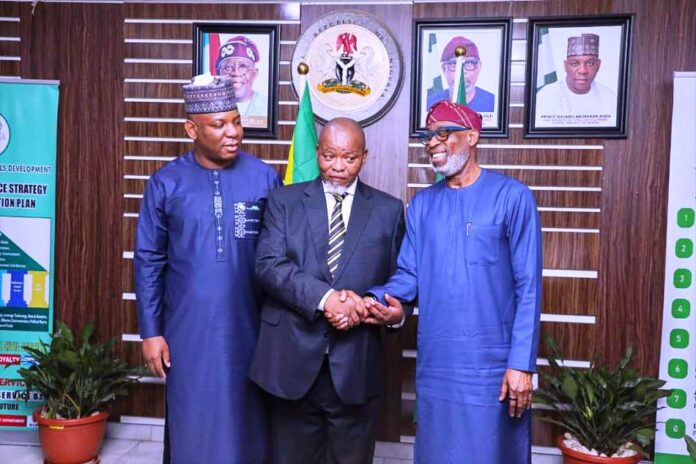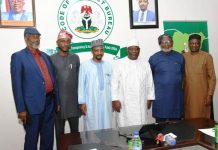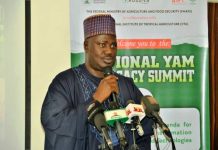
The Federal Government of Nigeria and South Africa have met towards strengthening the bilateral relationship between the two countries in the Mining Sector.
Nigeria-South Africa Technical Working Visit On Mining Sector Cooperation was held on Wednesday 16th April 2025 at the Ministry Of Solid Minerals Development Headquarters, Abuja to enhance cooperation in Geology, Mining, and Mineral Processing.
The South Africa Minister of Mineral Resources and Energy, Mr. Gwede Mantashe, led the delegation to the Ministry while the Ministers of Solid Minerals Development, Dr Dele Alake and the Minister of Steel Development, Prince Shaiubu Abubakar Audu, represented Nigeria at the meeting.
Delivering welcome remark, the Honourable Minister of Solid Minerals Development, Dr Dele Alake, noted that Nigeria and South Africa share a longstanding history of diplomatic and economic collaboration which is rooted in mutual respect and a shared vision for Africa’s prosperity.
As the largest economies on the continent, our partnership in the mining sector holds immense potential to drive industrialization, create jobs, and foster sustainable development across Africa.
According to him, the focus of the engagement, Enhancing Cooperation in Geology, Mining, and Mineral Processing, is both timely and strategic.
The Minister also noted that despite Africa’s endowment with vast mineral resources, the full benefits of the endowments have not been fully realized because of gaps in technology, infrastructure, and value addition.
He said “By working together, Nigeria and South Africa can bridge these gaps, leveraging South Africa’s advanced mining expertise and Nigeria’s burgeoning mineral wealth to unlock new opportunities for investment, skills transfer, and economic diversification.
“Nigeria is currently undergoing a major transformation in its mining sector under the Renewed Hope Agenda of His Excellency, President Bola Ahmed Tinubu, GCFR. We are committed to creating an enabling environment for responsible mining, attracting both local and foreign investments, and ensuring that our mineral resources contribute meaningfully to national development.
“The proposed Memorandum of Understanding (MoU) in the Field of Geology, Mining, and Mineral Processing will serve as a cornerstone for this collaboration, facilitating:
“Knowledge and Technology Transfer – Sharing best practices in exploration, extraction, and beneficiation to enhance efficiency and sustainability.
“Investment Promotion – Encouraging cross-border investments in mining projects and downstream industries.
“Capacity Building – Strengthening technical and regulatory frameworks through joint training and research initiatives.
“Regional Integration – Aligning with the African Mining Vision (AMV) to ensure that Africa’s minerals drive industrialization and inclusive growth.
“Value Addition – Strengthening the values of the Nigeria Solid Minerals before been introduced to the market.” Dr Alake added
Stressing that South Africa’s mining sector is one of the most advanced in the world, the Minister said Nigeria is eager to learn from her experiences while also showcasing Nigeria’s vast potential in critical minerals such as lithium, gold, tin, baryte, and rare earth elements.
“This partnership presents a unique opportunity to position both nations as leaders in sustainable mineral development on the continent.
He urged for the two sides to be guided by the principles of mutual benefit, shared prosperity, and environmental stewardship as the discussions continue.
“I am confident that the outcomes of this meeting will not only deepen Nigeria-South Africa relations but also set a benchmark for intra-African collaboration in the mining sector.” Dr. Alake said.
Speaking on the South Africa – Nigeria Cooperation, South Africa’s Minister of Mineral Resources and Energy, Mr. Gwede MANTASHE, said that the meeting followed the outcome of the 11th Session of the South Africa-Nigeria BNC held on 03 December 2024, in Cape Town, South Africa.
While stressing that Nigeria is endowed with over 40 unique minerals deposited in over 500 locations across the 36 states of the country, he said that the Nigerian Federal government has identified seven priority commodities including bitumen, iron ore, coal, barites, limestone, lead-zinc and gold.
He said “Among the aforementioned seven, only coal and iron ore are the most mined and attract the most investments. The remaining minerals, however, are largely unexplored due to the following three reasons.
“First, there is limited government participation in terms of policy guidelines and direction around mining activities. Second, Oil and Gas sector is the most revenue earner and to export in the country. Thus, other productive sectors such as mining and agriculture have not been developed to their full potential. Third, Nigeria does not have reliable power generation and supply to unearth the potential of its mining sector.” he pointed out.
Speaking on the opportunities for cooperation in the Mining Sector, he said “South Africa, with its well-established mining industry and expertise, offers significant opportunities for collaboration with Nigeria in various key areas of the mining value chain. As Nigeria works to strengthen its mining sector, cooperation with South Africa could contribute to capacity building, technology transfer, and substantial investment in mineral processing and beneficiation.”
He disclosed that relevant State-Owned Enterprises (SOEs) such as Mintek, Transnet, and Council for Geoscience (CGS) in South Africa, along with their Nigerian counterparts, could play pivotal roles in driving these initiatives forward.
A primary area of collaboration, according to him, is geological exploration and resource mapping.
He said that South African companies and institutions, particularly Mintek and CGS, which specialize in mineral exploration and geoscience, could assist Nigeria in conducting comprehensive geological surveys to more effectively assess and quantify its mineral reserves.
He said joint ventures between entities like CGS and Nigeria’s Nigerian Geological Survey Agency (NGSA) would enhance resource management and promote sustainable exploration practices, attracting additional investment into the sector.
Noting that capacity building and skills development also represent major opportunities, he said South Africa’s well-developed mining education and training institutions, such as Mine Health and Safety Council (MHSC) and the CGS, could support Nigeria in developing a skilled workforce through technical training programs, exchange initiatives, and joint research projects.
“Strengthening human capital in Nigeria’s mining sector will not only improve operational efficiency but also promote sustainable and responsible mining practice.” he added.
On investment in mineral processing and beneficiation cooperation, he said that South Africa’s experience in the value addition of raw minerals—transforming them into higher-value products before export—could help Nigeria reduce its dependence on the export of unprocessed minerals.
“By establishing partnerships in mineral processing with entities like Mintek, and CGS, both countries could create local industries focused on mineral-based manufacturing. This would also create significant employment opportunities and foster economic growth in both nations.”
Harping on the importance of regulatory and policy collaboration, he said that South Africa’s mining framework, led by entities like the Department of Mineral Resources and Energy (DMRE) and CGS, could offer valuable insights for Nigeria’s policy refinement.
“Exchange programs between regulatory bodies, such as the DMRE and Nigeria’s Ministry of Mines and Steel Development (MMSD), would promote best practices in mining governance, licensing, and environmental management, strengthening regulatory approaches for a sustainable mining environment.
“Strengthening cooperation between Nigeria and South Africa in the mining sector would drive mutual economic benefits, contributing to the sustainable growth of Africa’s mining industry through shared development, increased trade, investment, and technical collaboration.”Mr. Gwede Mantashe stated.
Giving the vote of thanks, the Minister of Steel Development, Prince Shaiubu Abubakar Audu, said that the meeting has reinforced the strong bilateral ties between the two countries.
According to him, it has provided a valuable platform for knowledge exchange, collaboration and strategic alignment in the critical sectors of mining and steel development.
The discussion, he said, has also underscored the shared commitment to harnessing the vast mineral resources for sustainable industrialization, economic…. and mutual prosperity.
Prince Audu noted that Nigeria is eager to depend the collaboration through technology transfer, capacity building and joint ventures that will drive value addition across the mineral value chain.
The meeting was attended by other members of the South African Delegation, Permanent Secretary, Ministry of Solid Minerals Development, Dr. Mary. A. Ogbe, Permanent Secretary, Ministry of Steel Development, Dr. Chris Osa Isokpunwu, directors and senior officials of the two ministries.
Signed
Kania Maliki Andeyaba
Deputy Director/Head of Press and Public Relations Department
16th April, 2025





